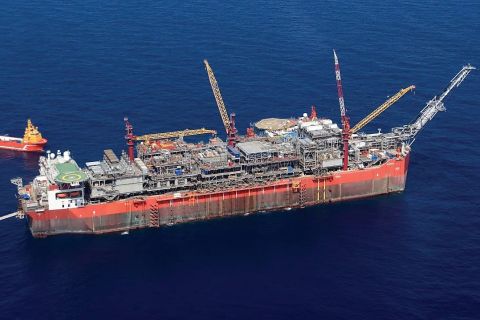When many investors think of Bulletin Board-traded E&P stocks, it is often with a healthy dose of skepticism. More than a few scam artists have tried to take advantage of sky-high commodity prices and unsuspecting investors in past oil and gas go-go days, energized by markets that appear to turn a profit for all involved. And with even Shell Oil Co. having difficulty with transparency and reserves reporting, it's no wonder many of the little guys, often bereft of analyst coverage or a lengthy reserves history, have had a rough time attracting financing and investors so they can grow. "There are a number of challenges for Bulletin Board E&Ps when it comes to access to capital markets," says Jeff Johnson, chief executive of Fort Worth, Texas-based Cano Petroleum Inc. Cano is among microcap producers; it recently graduated from the over-the-counter market to the American Stock Exchange. Microcaps face a lack of resources, specifically time and manpower. "SEC regulations haven't hit us any harder than the larger companies, but I think smaller companies don't have as many resources to throw at it," Johnson says. At press time, Cano executives were working to beat SEC deadlines. "We see opportunities here," says Johnson, "because many of the small E&Ps simply won't make the extended deadline. We are solidly on track to be in full compliance much sooner than required. This will likely thin out the playing field for us." Louis Fruchier, vice president, corporate development and communications, for Houston-based Petrogen Corp., says, "The additional formalities that must be adhered to by the junior E&P are substantially greater and require additional capital and human resources. In that regard, it is more difficult for the junior-listed E&P to survive." Andrew P. Calerich, president and chief financial officer at Denver-based microcap American Oil & Gas Inc., adds, "OTC companies are limited as far as investor audience. Many brokers and brokerage firms are prohibited from [dealing in] OTC company stock." Like Cano, American Oil & Gas recently graduated to the American Stock Exchange. Despite hurdles, these microcaps aim to succeed using solid E&P acumen from seasoned managers and well-connected board members as their toehold. Here are a few. BPZ Energy Inc. This Houston-based company (OTCBB: BPZI) has exclusive E&P rights and licensing agreements covering 2.7 million acres in four blocks in northwest Peru and owns a nonoperated interest in production in southwest Ecuador. At year-end 2004, the company's proved reserves on Block Z-1 off northwest Peru totaled 133 billion cubic feet equivalent (Bcfe). In June 2004, it acquired a 6% interest in the Santa Elena properties in Ecuador, which produce 2,000 barrels per day. Key management includes Thomas Kelly, chief executive officer, and Fernando Zúñiga y Rivero, chairman. Kelly founded and managed several energy-related companies including Baytech Inc. and First Permian LLC. Rivero was chairman and CEO of Petróleos del Peru and managed energy projects for the World Bank for 17 years. BPZ's executives are positioning the company to file an application to list on the American Stock Exchange around midyear. FieldPoint Petroleum Corp. Cedar Park, Texas-based FieldPoint (OTCBB: FPPC) was formed in 1998 through the merger of Bass Petroleum and Energy Production Corp. It has interests in more than 339 wells and operating control of 61 wells in New Mexico, Oklahoma, Texas and Wyoming. Its debt in early May was less than $1.4 million. It targets deep gas and long-lived reserves. Plans are for drilling four wells this year. Production is some 230 barrels of oil equivalent (BOE) per day and may grow to 500 by year-end. Ray D. Reaves, chairman and CEO, began his career in 1986 with North American Oil and Gas. In 1989 he purchased an interest in 10 of its wells and formed Bass Petroleum Inc., which soon acquired interests in another 60. Kent Casey, vice president of investments at Connecticut-based Source Capital Group, says, "Ray Reaves started with nothing. In order to learn the oil and gas business, he took a job as a pumper for 10 wells at minimum wages and soon realized that in order to make any serious money, he would have to own them. He actually ended up owning those 10 wells a year or so later. He learned [the business], built it and has grown it, all on his own. Ray leads by example, and it's a rare breed that can do what he's done in this business." Becky Dozier, senior vice president of Houston-based financier Redstone Bank, worked with Reaves on his first bank loan when heading Bass Petroleum. "Ray is hard-driving, thorough and extremely capable," she says. Casey says, "When investors look at a company, it's all about management and valuation-a combination of proven reserves and assessment of a company's future plans. Ray has put FieldPoint in a great position." Board member Roger D. Bryant was president of Dresser Industries Inc., Wayne division, and president of Schlumberger Ltd., retail petroleum systems division. Dan Robinson, another board member, is CEO of Placid Refining Co., a Hunt family-owned company. FieldPoint plans to one day move to the Amex or Nasdaq. Galaxy Energy Corp. Denver-based Galaxy (OTCBB: GAXI) develops coalbed-methane and other gas properties in the Powder River Basin of Wyoming (59,000 net acres), Montana (32,000 net acres), Colorado, Texas and Europe. "I've known Chris Hardesty [Galaxy's director of corporate finance] for almost 20 years, and respect his financial conservatism," says Frank Bracken III, managing director at investment-banking firm Jeffries & Co. Inc. "The company is very well-heeled. "Most of the shallow coals have been developed by big operators in a very cookie-cutter way. Galaxy is trying to apply a finer-toothed comb to the coals in the Powder River Basin, going after areas that are tougher to produce. They are trying to attack subtleties, and their results to date indicate success and the potential to grow reserves and production." Founder and president Marc E. Bruner was president of Dolphin Energy Co. and an investment banker and analyst for Resource Venture Management AG. Carmen Lotito, executive vice president, CFO and treasurer, is also a director of Colorado-based Gasco Energy Inc. Cecil D. Gritz, chief operating officer, was an engineer for Shell Oil, Denver-based Vista Resources Inc. and other producers. James Edwards, a director, was chief geologist for Triton Energy Corp. While there, he participated in the discovery of the giant Cusiana/Cupiagua field complex in Colombia. Bruner's father, Marc A. Bruner, is chairman of Galaxy's advisory committee. He assisted in the formation of Ultra Petroleum Corp. and Pennaco Energy Inc., the latter of which was purchased by Marathon Oil Co. in 2001. Galaxy is discussing a move to Amex. Heartland Oil & Gas Corp. Vancouver-based Heartland (OTCBB: HOGC) has been buying leases in Kansas' coalbed-methane-prospective Forest City Basin since 2000, where it now holds some 1 million acres, of which 765,000 were purchased from Denver-based Evergreen Resources Inc. At press time, Heartland had nearly 100 wells of which 77 were dewatering or venting, 15 were awaiting stimulation and eight are saltwater disposals. Key people include Richard Coglon, president; Philip S. Winner, chief operating officer; and directors Randy Buchamer and Michael D. Bodino. Coglon co-founded Velvet Exploration Ltd. in 1995, which was sold for $450 million, and president and CEO of Canada-based TransGlobe Energy Corp., for which he won an initial production-sharing agreement in Yemen. Winner was vice president of HS Resources preceding its sale to Kerr-McGee Corp. Prior, he was in reserve management for Apache Corp. Buchamer was vice president and chief operating officer for Mohawk Oil, western Canada's largest independent gas retailer before it was acquired by Husky Oil. Bodino is senior vice president, energy corporate finance, for financier Sterne, Agee & Leach Inc. Additionally, Heartland's advisory board includes former Evergreen Resources executives Mark S. Sexton, Kevin R. Collins and J. Scott Zimmerman. (For more on Heartland, see "Kansas," Oil and Gas Investor, May 2005.) Maverick Oil and Gas Inc. Fort Lauderdale, Florida-based Maverick (OTCBB: MVOG) is a Texas-focused E&P that targets gas in the Maverick Basin and the Barnett Shale. In January, it sold $30 million of shares in an oversubscribed offering; the funds have purchased three new projects. Assets include a 37% interest in 80 wells on 10,240 acres in Maverick County, Texas; 75 wells on 12,000 acres in the Barnett Shale; an 8.5% interest in 150 wells on 9,400 acres in Tom Green County, Texas; a 15% interest in 150 wells on 4,800 acres in Pecos County, Texas; and a 27% interest in 500 wells on 41,000 acres in the Piceance Basin, Colorado. In March, it acquired Hurricane Energy LLC, led by ex-Sunoco executive V. Ray Harlow, John A. Ruddy and James M. Parrish and who are now senior managers at Maverick. At press time, it planned to acquire Dallas-based Camden Resources Inc. for $88 million. Financing was being arranged by Sanders Morris Harris. South Texas-focused Camden has 59 Bcfe of proved reserves and 71 Bcfe of total reserves, 96% gas. Net production may grow to approximately 30 million cubic feet equivalent per day by mid-2007. Prior to Hurricane Energy, Harlow, Maverick CEO, was chairman and managing director of the international businesses of Sunoco Inc., and with Arco, Amoco and Transcontinental Oil Corp. Another key Maverick member is Michael Garland, a director, who was a founder of Star Energy Group in the U.K. and was with Tullow Oil. Petrogen Corp. Houston-based Petrogen (OTCBB: PTGC) targets low-risk gas reserves on the Texas Gulf Coast and in the Permian Basin on 24,000 gross acres in Texas, Wyoming and Mississippi. Its first discovery well, on Emily Hawes Field in the Texas Gulf Coast, is expected to be hooked up to the company's transmission pipeline and producing gas this quarter. It aims to drill as many as 14 wells this year. It recently purchased a gas pipeline on Matagorda Island, Texas, from Sweet Oil Co., that can carry some 20 million cubic feet of gas per day. The pipeline is the only gas-gathering right of way on the island. The company has substantially low-cost production, says Louis Fruchier, a vice president. "Therefore, during this period of high commodity prices, we are focused primarily on the development of our current assets." Sam Sen, president, was project manager, worldwide business development, and manager, new venture development, for Anadarko Petroleum Corp., and previously was with Unocal Corp., Suncor Energy and Gulf Canada. The company may move to Amex or Nasdaq. Quest Resource Corp. Oklahoma City-based Quest (OTCBB: QRCP) has more than 1,000 coalbed-methane wells in the Cherokee Basin of Kansas and northeastern Oklahoma, and by year-end expects to have 1,200 wells producing a total of 60 million cubic feet per day. It targets the Mulky and Summit Rowe and Riverton coalbeds. Reserves at year-end 2004 totaled 150 Bcfe, 54% proved developed, at a finding and development cost of $1.66 per thousand equivalent. Dallas-based Energy Capital Solutions LP advised Quest and arranged financing for a $126-million acquisition from Devon Energy Corp. that has helped take Quest's acreage position to some 600,000. Keith Behrens, managing director, says a variety of capital sources were interested in Quest's low-risk asset base and upside. "They've put together a strong team to pursue their strategy of consolidating smaller players and building their reserves base," he says. Key management includes Jerry Cash, chairman. Cash was with Bodard & Hale Drilling Co. and in 1987 he formed STP Inc. (For more on Quest, see "Kansas," Oil and Gas Investor, May 2005.) Westside Energy Corp. This Houston-based company (OTCBB: WEGC) is focused on Barnett Shale properties in the Fort Worth Basin. It had zero debt and a market cap of $70 million in early May. The company has partial interest-75% gross, 60% net-in one well, the Lucille Pruitt #1, in Denton County, Texas, and interest in 61,021 gross acres (59,073 net). This year, it has allotted $14.35 million for drilling. Management includes Jimmy D. Wright, CEO and CFO, and Keith D. Spickelmier, a director. Wright was senior vice president of EnergyClear Operating Corp., and held senior management positions with Midcoast Energy Resources, which merged into Enbridge Inc. Spickelmier was president of EnergyClear and an attorney at Haynes & Boone. Board members include Douglas Manner, John Raymond and Herbert C. Williamson III. Manner is chief operating officer of Kosmos Energy LLC, a private E&P focused offshore West Africa. Manner was with Ryder Scott Petroleum as a senior vice president, CEO of Mission Resources Corp., and CEO of Bellwether Exploration. Raymond was CEO of Vulcan Energy Corp. and a director of Plains All American; CEO of Plains Resources; president of Plains Exploration & Production; and with Howard Weil. Williamson was a director of Pure Resources and is on the board of Mission Resources. Prior, he was CFO of Merlon Petroleum Co; vice chairman for Parker & Parsley Petroleum Co., now Pioneer Natural Resources Co.; and held executive positions with Petrie Parkman & Co., Credit Suisse First Boston and Lehman Brothers. Westside is evaluating options to list on Nasdaq, Amex or the New York Stock Exchange. Whittier Energy Corp. Houston-based Whittier (OTCBB: WHIT) operates 39 wells in eight fields on the Gulf Coast of Texas and Louisiana and has nonoperated working interests in fields in Oklahoma, Texas, Louisiana, Wyoming and California. At press time, it planned a $56-million acquisition of privately held Rimco Production Co. Inc., doubling its size. As of March, production was 1,030 BOE per day, net. Year-end 2004 reserves were 2.66 million BOE. Drilling plans for 2005 include two wells in the Scott & Hopper Field, Brooks County, Texas; one well in the North Rincon Field, Starr County, Texas; two wells in the Owen Field, Webb County, Texas; one well in the Tom Lyne Field, Live Oak County, Texas; and one well in the Amber prospect, Iberia Parish, Louisiana. Whittier's total debt was $9.5 million of debt, at press time. Bryce Rhodes, president and CEO, is also on the board of Denver-based Pyr Energy Corp. Daniel Silverman, chief operating officer, was the managing director of acquisitions and divestitures for Torch Energy Advisors and manager of A&D for Apache Corp. Michael Young, CFO, was vice president and CFO of Chaparral Resources Inc. Chuck Buckner, a director, was with Ernst & Young as a coordinating partner and a co-chair of Ernst & Young's global energy group. James A. Jeffs, chairman, was co-chair and chief executive of Chaparral. Whittier plans to move eventually to a national exchange. THE GRADUATES In May, three participants in this article graduated to the American Stock Exchange, an event that is expected to result in their stories having improved exposure to the investment marketplace. Following are descriptions of each. American Oil & Gas Inc. Rockies-focused American Oil & Gas (Amex: AEZ) has no debt and has raised funds through private placements. Assets include interests in 12 producing wells in Montana, and a 5% to 10% working interest in 20 coalbed-methane wells in the Powder River Basin, Wyoming. It also owns working interests in 160,000 gross acres in the Powder River Basin; a 6,400-gross-acre, heavy-oil prospect in Box Elder County, Utah; a 10,000-gross-acre oil prospect in the Williston Basin, North Dakota; and an 18,000-gross-acre coalbed-methane prospect in the Big Horn Basin, Wyoming. Patrick D. O'Brien, chief executive and chairman, co-founded Tower Colombia Corp. in 1995. Andrew Calerich, president and chief financial officer, was vice president and CFO for PYR Energy Corp., another Denver independent. Cano Petroleum Inc. Fort Worth-based Cano (Amex: CFW) applies enhanced-recovery methods to mature Midcontinent assets and had an early May market cap of $85 million with no long-term debt. Jeff Johnson, chief executive, began his career in corporate finance, raising funds for oil and gas partnerships for Chesapeake Energy Corp. in South Texas. In 1993 he initiated his first independent exploration venture, leading to the purchase of Scope Operating Inc. in 1997. Michael Ricketts, Cano CFO, is a former treasury director and controller for TNP Enterprises Inc. and was also with Union Pacific Resource Co. and KPMG. Gerald Haddock, a director, is a founding director of drilling company Ensco International Inc. Dune Energy Inc. Houston-based Dune (Amex: DNE) aims to grow on the Gulf Coast and in North Texas organically and through acquisitions, such as a $56-million deal in the Barnett Shale that is under way and for which investment-banker Sanders Morris Harris Inc. is arranging financing. Alan Gaines, chairman and CEO, was a co-founder of Gaines, Berland Inc., an investment bank to small and midcap E&P and other energy-related companies. More recently, he was president and CEO of Proton Capital LLC, a private merchant and energy-investment bank. "I've known Alan for some 15 to 20 years," says Tom Edelman, chairman and chief executive officer of Denver-based Patina Oil & Gas Corp. "He is a smart, aggressive and persistent guy who has a long track record of making a lot of projects come to fruition. He is a lot more likely than your average guy to get things done in the energy business, and I've always been impressed with his ideas and his execution." Another key person at Dune is Amiel David, president and chief operating officer. David was managing director, senior vice president and chief engineer at Duke Capital Partners, and previously was with First City Bank and Union Securities (now Wachovia).
Recommended Reading
E&P Highlights: April 22, 2024
2024-04-22 - Here’s a roundup of the latest E&P headlines, including a standardization MoU and new contract awards.
E&P Highlights: April 8, 2024
2024-04-08 - Here’s a roundup of the latest E&P headlines, including new contract awards and a product launch.
Deepwater Roundup 2024: Offshore Europe, Middle East
2024-04-16 - Part three of Hart Energy’s 2024 Deepwater Roundup takes a look at Europe and the Middle East. Aphrodite, Cyprus’ first offshore project looks to come online in 2027 and Phase 2 of TPAO-operated Sakarya Field looks to come onstream the following year.
Remotely Controlled Well Completion Carried Out at SNEPCo’s Bonga Field
2024-02-27 - Optime Subsea, which supplied the operation’s remotely operated controls system, says its technology reduces equipment from transportation lists and reduces operation time.
E&P Highlights: March 15, 2024
2024-03-15 - Here’s a roundup of the latest E&P headlines, including a new discovery and offshore contract awards.





